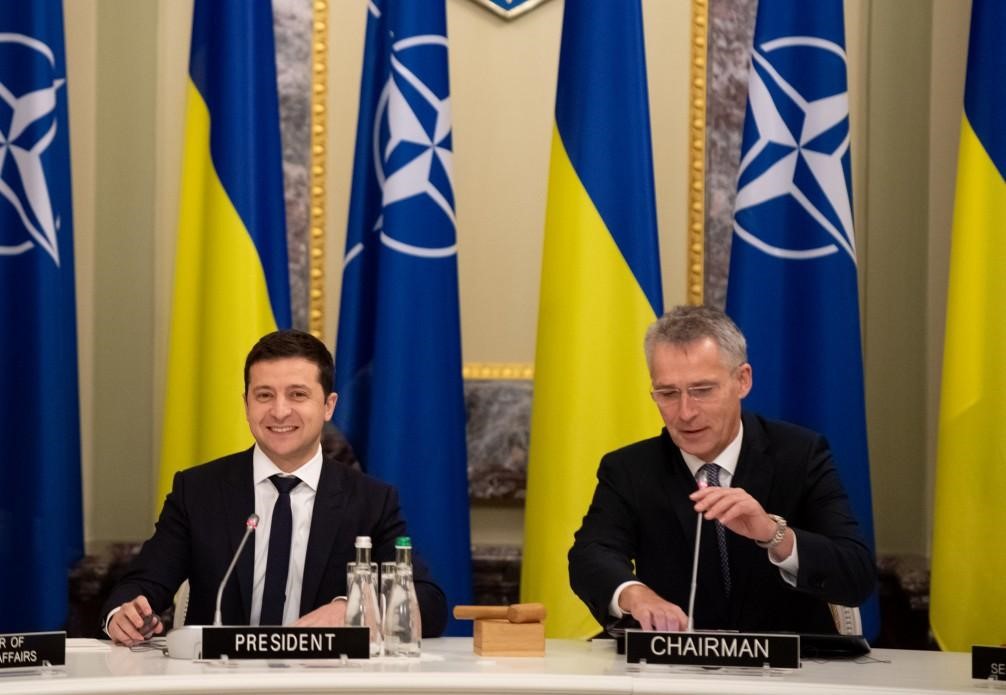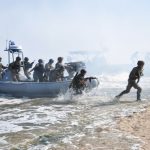UKRAINE MONITOR
Date: 6 November 2019
Ukraine in NATO? Zelensky and Stoltenberg Adopt Unequivocal Positions
If anyone has doubted in recent months that the new ruling camp in Kyiv does not care about integration with NATO, as did their predecessors, now is the time to change your perspective. A recent meeting of the Ukraine-NATO Commission and the speeches given by the President of Ukraine and the Secretary General of NATO confirm that both sides will become even more involved in mutual rapprochement and cooperation. The ultimate goal is to make Ukraine a full-fledged member of NATO.

On October 30, Jens Stoltenberg together with the representatives of the North Atlantic Council arrived in Ukraine. On the first day of their visit, they went to Odessa, and on the second, they headed to Kyiv. Together with Ukraine’s President Volodymyr Zelensky, the guests participated in a meeting of the Ukraine-NATO Commission and met with other representatives of the Ukrainian authorities. During the trip to Odessa, the NATO delegation toured four Alliance vessels that are currently conducting patrols in the Black Sea (from Bulgaria, Italy, Romania and Spain). In Odessa, Stoltenberg delivered a speech on the Donbass and Crimea, speaking to the students of the Odessa National Maritime Academy. The day before, government troops and Russia-backed separatists began withdrawing from the frontline town of Zolote. The NATO Secretary General once again called on Moscow to stop supporting the separatists in eastern Ukraine and to withdraw its forces and military equipment from Ukrainian territory. Stoltenberg also reassured that NATO will never recognise Russia’s “illegal annexation” of Ukraine’s Crimea, and said that the Alliance strongly condemns Russia’s aggressive actions in the Black Sea region. The Alliance calls on Russia to return to Ukraine the ships detained in November 2018 during the so-called “Kerch Strait incident”. NATO also expects that Russia will not block access to Ukrainian ports in the Sea of Azov.
Support Us
If content prepared by Warsaw Institute team is useful for you, please support our actions. Donations from private persons are necessary for the continuation of our mission.
On the second day of the visit to Ukraine, a meeting of the Ukraine-NATO Commission was held in Kyiv. Right after the meeting, during a joint press conference, President Volodymyr Zelensky stressed that Ukraine is ready to accelerate preparations for membership in the North Atlantic Alliance. Stoltenberg stated that the visit is an expression of NATO’s continuing support for the country which is “one of the closest partners” of the Alliance. The Secretary General informed that NATO has been providing assistance for Ukraine’s armed forces, training Ukrainian soldiers and supporting reforms. Stoltenberg also referred to the position of Hungary, which blocked the adoption of a joint declaration of NATO countries on Ukraine that was supposed to be announced in Kyiv. Budapest vetoed the document when it turned out that the other allies had rejected adding to the declaration provisions regarding the Hungarian minority in Ukraine’s Transcarpathia. “Mr President, you have a very strong mandate to implement key reforms. I have repeatedly expressed the importance of minority rights. All Allies agree that Ukraine should fully implement the Venice Commission recommendations,” the NATO Secretary General said. Stoltenberg’s words about the “very strong mandate” that Zelensky has received may be a suggestion that the president should use it to introduce certain changes to the legislation that is strongly criticised by Hungary. It is about the Ukrainian laws on education and language. Budapest claims that they violate the rights of the Hungarian minority and, for this reason, since autumn 2017, it has been blocking NATO-Ukraine meetings at ministerial level.
Concluding his visit, the NATO Secretary General delivered a speech to the Ukrainian parliament. “As a sovereign nation, Ukraine has the right to choose its own security arrangements. NATO’s door remains open,” said Jens Stoltenberg, addressing the Verkhovna Rada. He emphasised that only NATO members states and applicant countries decide on the enlargement of the Alliance. “No outside country has the right to veto. The time of spheres of influence is over,” Stoltenberg highlighted, clearly referring to Russia’s position. The NATO Secretary General also reminded Ukrainian MPs that it is not possible to apply for membership in the Alliance without implementing a series of internal reforms. NATO is especially looking forward to the implementation of the law of national security adopted in 2018, which is set to provide parliamentary control over security agencies and defence institutions. Another pressing issue is the reform of the Security Service of Ukraine.
All texts published by the Warsaw Institute Foundation may be disseminated on the condition that their origin is credited. Images may not be used without permission.














